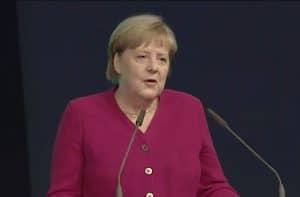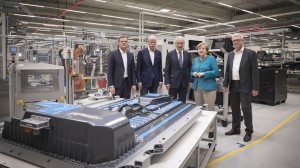
German Chancellor Angela Merkel has marshaled support for EV development to the tune of $147 billion.
The headline in this story has been revised to more accurately reflect the story’s content.
The German government is moving ahead with a stimulus package that includes generous help for electric vehicles.
Angela Merkel, Germany’s chancellor, said the package, which is a combination of economic stimulus and support for future technologies, is worth a total of $147 billion.
Merkel has gotten high marks by German voters for her handling of the COVID-19 crisis even through the number of cases has increased as the country opened up its economy and schools. The death rate per capita in Germany is only a fraction of those in other European countries such as Great Britain.
(All-electric vehicles will need decades to take over, cautions GM CEO Barra.)

Merkel’s government eschewed a request from car dealers to offer subsidies on ICE-powered vehicles and applied the funds to growing the EV charging network.
The Chancellor’s stimulus package includes reform of Germany’s motor vehicle tax so that owners of vehicles with higher emissions, such as SUVs will pay higher taxes. Starting January 2021, owners of cars with emissions of more than 95 grams of carbon dioxide will gradually pay more taxes.
The higher taxes on SUVs follows a series of attacks in Berlin and other cities in Germany where expensive utility vehicles were burned by vandals who claimed they damaged the environment.
The government also is doubling its share of the purchase incentive for battery-electric vehicles and hybrid cars. The German government will now pay a grant of $6,800 for a purely electric car. In addition, car manufacturers grant a subsidy of $3,400. Merkel rejected an auto industry request to incentivize vehicles with internal combustion engines in favor of a plan to increase charging infrastructure.
(Germany’s Merkel encourages automakers to get greener.)
The German government also plans to require all fuel stations to provide EV charging. To further boost e-mobility, the government is adding an additional $2.8 billion to its existing program to build charging stations and support battery cell production. It’s also cutting the country’s VAT from 19% to 16% for the second half of the year.
The program earmarks $56.6 billion for the future with tax breaks for research into the development of quantum computing and artificial intelligence. Officials also stated the use of hydrogen power and better promotion of electric vehicles will be increased.
“We believe that this range of policies intended to boost the sale of EVs within Germany will further accelerate the uptake of EVs over 2020, however, the lack of support for internal combustion engine (ICE) vehicles means that automakers will continue to struggle in 2020,” the Fitch Rating Service said in a report on the new plan.
(Frankfurt Plugs In. Automakers Hope to Charge Up Buyers with New EVs.)
“That said, we believe that this will help give German automakers a fighting chance to reach the EU’s mandatory European average fleet emission target of 95g/km of carbon dioxide by Jan. 1, 2021. However, the risks are firmly towards the downside as the majority of automakers’ sales still come from ICE vehicles and higher polluting SUVs remain very popular,” the report said.


Merkel’s East German roots are showing more and more.